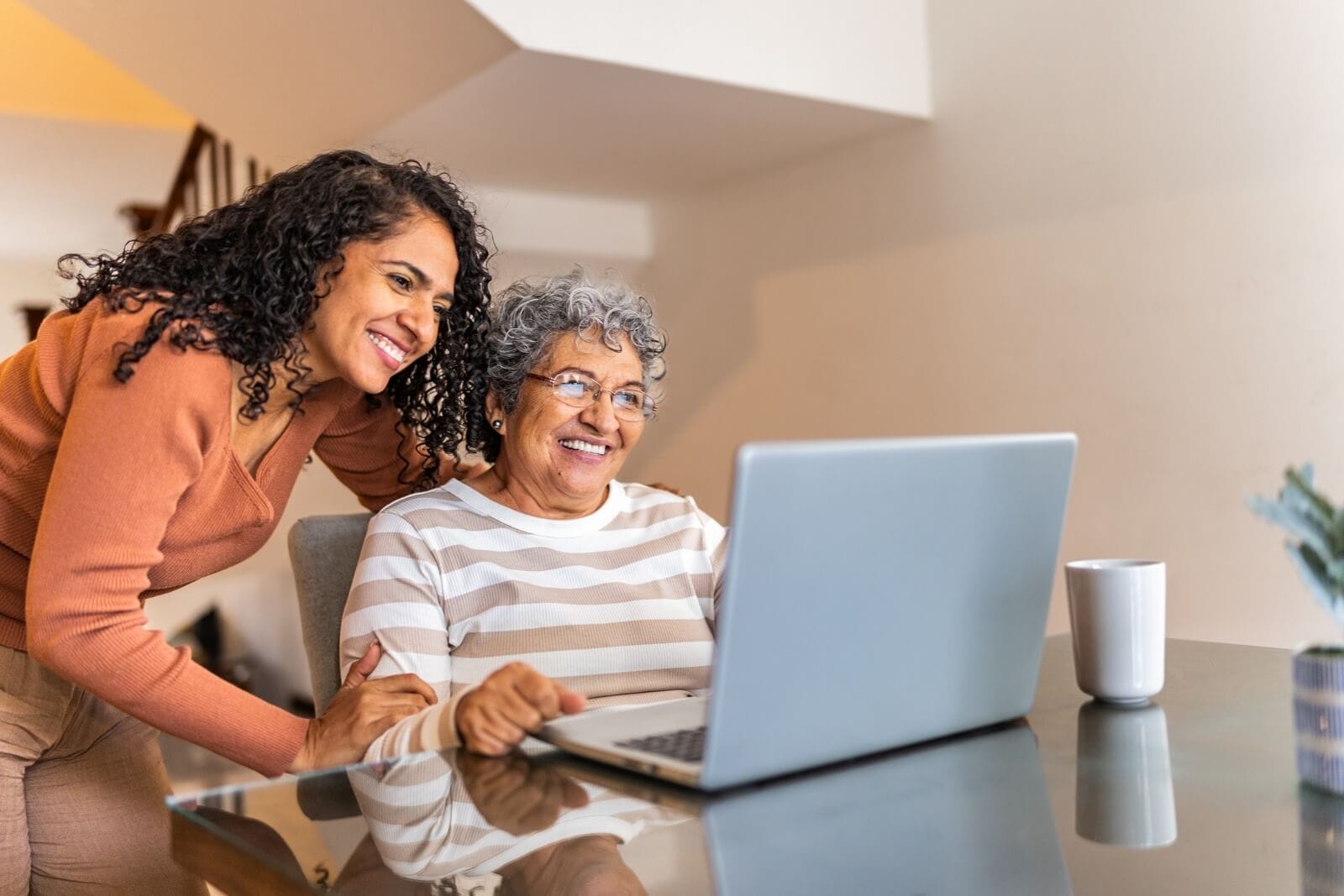
If you have an older adult loved one who lives alone, you may worry about them feeling isolated. Maybe you’re concerned that they are lonely, or perhaps they have told you they are. While living at home alone isn’t a reason for worry in itself (about 11% of one-person households in America are adults over the age of 65, according to the U.S. Census Bureau), there are some concerns when it comes to older adults who are isolated. Here, we go over some of the signs and risks of social isolation and tips for preventing it.
The difference between being alone and feeling isolated
If your loved one lives alone, it doesn’t necessarily mean they are isolated. They might still meet up with friends for coffee each morning or attend group exercise classes multiple times per week. This is living alone, not isolation. The Centers for Disease Control and Prevention classifies isolation as the lack of personal relationships with no social support. Seniors living alone should have relationships with peers their age in addition to family members, and they should connect with these peers multiple times throughout the week.
If you want to learn more about your parent’ social engagement and emotional well-being, the best way to do so is by talking with them and visiting them if you can. When you talk to them, look for some of these signals that they have personal relationships and social support:
- Do they talk about friends or peers that they speak with or spend time with?
- Do they engage in hobbies that either bring them outside the home or put them in contact with peers?
- Do they express that they feel lonely at times?
- Do they feel bored or lack things to do? Friends to talk to?
If you suspect they feel isolated and lonely, talk to them more about it. They might need a simple reminder of the hobby they used to love. Suggest looking at the calendar of their senior living community or local senior center. You can tell them that social isolation can negatively affect them, and it’s important to take it seriously. It may make the conversation easier if they realize that loneliness isn’t just something to deal with and can hurt a person’s mental health.
Dangers of social isolation
Social isolation poses many risks to older adults. Research tells us that social isolation has some severe mental and cognitive health consequences for older adults. According to the CDC, around 20% of people aged 55 and over have a mental health concern. Loneliness can make these concerns worse: It has been linked with increased chances of depression, anxiety, addiction issues, and suicide. People who are socially isolated are also at an increased risk of developing dementia or experiencing a faster progression of the disease.
Social isolation also affects physical health. Older adults who are socially isolated are at an elevated risk for Type 2 diabetes, heart disease, and stroke. They are at an overall higher risk of premature death. Isolation is a serious concern for the overall well-being of older adults. Luckily, there are ways you can help your loved one stay connected with peers, community members, and family.
Tips for preventing isolation
Consider the social support and calendar of your loved one who lives alone. If they have expressed loneliness, don’t meet up with friends at least a few times per week, or don’t have an active social calendar, they may be socially isolated and, therefore, at risk for physical and mental health consequences.
Work on preventing social isolation by empowering them to focus on creating or nurturing relationships with peers in the neighborhood, their church, or other places throughout the greater community. Here are some tips:
- Stop by to help your loved one schedule their social gatherings for the next month. Brainstorm fun ideas with them, help them make phone calls or send texts to set up the events, and write them on your loved one’s calendar.
- Host a weekly coffee meetup at your loved one’s house for their friends. You can make the coffee, set out refreshments, and clean up so that your loved one can spend time with their friends.
Even if you don’t live nearby, you can assist your loved one with maintaining an active social life:
- Review the program guide for your loved one’s local senior center or senior service agency. Pick out a few events they are interested in and book transportation so they can get there and back home safely.
- Remind your loved one of the power of connection and the health benefits of spending time with others. Have your loved one’s physician reinforce this idea and encourage socializing as a part of their overall wellness plan.
- Have neighbors check in with your loved one regularly. Even a quick 10-minute conversation on the porch can help them feel connected to their community.
- Use technology to stay connected. You can schedule regular phone or video calls, correspond via email, or send them a digital picture frame to which you can upload photos from afar. These tools can help your loved one to keep in touch with far-away friends and family in addition to their social interaction with nearby peers.
Companion care
For some older adults, connecting with peers isn’t as easy as setting up a coffee date at a local diner. They might need more support with transportation, ambulation, and reassurance during social events. In this case, a home care agency might be the perfect solution.
Nonmedical home care services often include transportation and companionship. A caregiver could come to your loved one’s home, help them get ready for their coffee date or fellowship meeting, drive them there, escort them in, and provide companionship while they are at the event. Companionship care can also include visiting the home to play card games, stroll around the neighborhood, or reminisce about favorite topics.
Is your loved one isolated?
If you’re still unsure if your loved one is isolated or thriving at home, consider these questions:
- Has your loved one expressed feelings of loneliness in the past month? This could be an indicator of social isolation.
- Does your loved one drive? No longer driving can make connecting with peers significantly more challenging, even if the person can take public transportation independently.
- Does your loved one have hearing loss, vision loss, or cognitive decline? Each of these conditions can contribute to feeling anxiety in social groups, which can cause them to decline social invitations.
- Does your loved one require assistance with ambulation? It can feel embarrassing to ask for assistance or use a mobility device in a social setting, especially if the device is new.
- Does your loved one frequently decline social gatherings with friends and family? If your loved one often chooses to stay at home alone, it can quickly lead to isolation and fewer invitations from family or friends.
Talk with your loved one if you have noticed any of the above. Using our tips, you can devise a plan to combat social isolation and give your loved one the vibrant social life they deserve.
Remember, living alone does not always mean the person is socially isolated. However, it can increase the risk of isolation, which can lead to physical and mental health challenges. Work with your loved one to boost social connections long before they feel isolated to see the best results. With your help, your loved one can thrive in later adulthood by connecting with peers and loved ones.








